|
|
|
Sort Order |
|
|
|
Items / Page
|
|
|
|
|
|
|
| Srl | Item |
| 1 |
ID:
128416


|
|
|
|
|
| Publication |
2014.
|
| Summary/Abstract |
Air-conditioners and antibiotics are two technologies that have both been traditionally framed around individual health and comfort needs, despite aspects of their use contributing to social health problems. The imprudent use of antibiotics is threatening the capacity of the healthcare system internationally. Similarly, in Australia the increasing reliance on air-conditioning to maintain thermal comfort is contributing to rising peak demand and electricity prices, and is placing an inequitable health and financial burden on vulnerable heat-stressed households. This paper analyses policy responses to these problems through the lens of social practice theory. In the health sector, campaigns are attempting to emphasise the social health implications of antibiotic use. In considering this approach in relation to the problem of air-conditioned cooling and how to change the ways in which people keep cool during peak times, our analysis draws on interviews with 80 Australian households. We find that the problem of peak electricity demand may be reduced through attention to the social health implications of air-conditioned cooling on very hot days. We conclude that social practice theory offers a fruitful analytical route for identifying new avenues for research and informing policy responses to emerging health and environmental problems.
|
|
|
|
|
|
|
|
|
|
|
|
|
|
|
|
| 2 |
ID:
110780
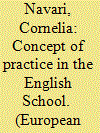

|
|
|
|
|
| Publication |
2011.
|
| Summary/Abstract |
The English School concept of practice is what Stephen Turner in The Social Theory of Practices calls a 'telic' notion. A telic practice is an activity seeking a goal 'which is conceived as a result of following certain general principles of procedure'. Examples of telic practices are playing a game of chess, holding a seminar, baptizing a baby or going fly-fishing. Such practices are carried out according to standards of excellence set forth in some tradition of interpretation. Maurice Keens-Soper has placed de Caillèires' De la maniere de negocier avec les souverains in a tradition of interpretation applied to diplomacy, and one that set standards. A practice in the English School sense is not a private idea: a commitment to communal standards is required if one is to talk meaningfully of a practice. A telic notion of practice may be contrasted with a causal notion. In the causal notion, a practice is a form of mentalist 'object' which impinges on behaviour. Pierre Bourdieu (1977), for example, is interested in practices as hidden convictions or habits shared by a group; his 'habitus' informs social action. Either as a kind of presupposition, or as a kind of mental trace, a practice in the causal sense disposes thought or action in a certain way. In this form, practices are not directly accessible, their existence must be inferred, and the means of accessing them are fraught with difficulties. A person engaging in a telic practice is guided by its standards rather than being caused to perform, and telic practices are directly accessible to empirical investigation.
|
|
|
|
|
|
|
|
|
|
|
|
|
|
|
|
| 3 |
ID:
094851
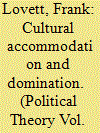

|
|
|
|
|
| Publication |
2010.
|
| Summary/Abstract |
When should burdened social practices be granted special accommodation? One issue of concern-raised by Okin and others-is that some social practices involve domination, and so the accommodation of those practices might (inadvertently, perhaps) support social injustice. Suppose one wants to take this concern very seriously. Starting from the assumption that freedom from domination is an especially important value, this article examines whether cultural accommodation would ever be advisable. Approaching the problem of multicultural accommodation from this point of view greatly clarifies the debate and yields some interesting results. In particular, the discussion concludes that there are circumstances under which the goal of minimizing domination itself would be furthered by policies of special accommodation.
|
|
|
|
|
|
|
|
|
|
|
|
|
|
|
|
| 4 |
ID:
153697
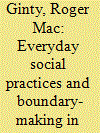

|
|
|
|
|
| Summary/Abstract |
Based on empirical evidence and conceptual scoping, this article builds a typology of everyday social practices in a deeply divided society. The typology distinguishes between moderating and non-moderating practices relating to boundaries. Based on a case study of contemporary Lebanon, it describes how boundary making and maintaining are the stuff of everyday life in deeply divided societies. But it also describes how the society under study also contains much evidence of fluidity and permeability in relation to boundaries. Many of these instances of boundary crossing do not threaten the meta politico-religious boundary, but they do compel us to re-evaluate views of deeply divided societies as comprised of homogenous and uncompromising blocs.
|
|
|
|
|
|
|
|
|
|
|
|
|
|
|
|
| 5 |
ID:
148315


|
|
|
|
|
| Summary/Abstract |
If a European organisation decides to deploy a military force in Mali or a police mission in Afghanistan, member states probably believe that collective security is a public good that benefits them all. But who will lead the mission? Who will staff it? Who will pay for it? Who will risk casualties? While rational-choice theorists expect little burden sharing, constructivists expect a great deal more insofar as normative pressures are brought to bear on governments. The problem is that it is hard to find countries that systematically eschew their responsibilities or, contrariwise, systematically contribute their fair share out of a sense of moral obligation. In this article, we analyse burden sharing as an anchoring practice, shedding light on the social logic of burden sharing rather than abstract interests or norms. Established after the end of the Second World War, the field of European security has given birth to a “community of security practice” around the more or less routine task of determining national contributions to crisis management operations. Based on interviews with practitioners from the UK, France, Germany, Norway and Ireland, we analyse the impact of intersubjectivity, power and strategic culture on the practice of burden sharing.
|
|
|
|
|
|
|
|
|
|
|
|
|
|
|
|
| 6 |
ID:
133218
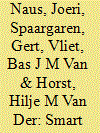

|
|
|
|
|
| Publication |
2014.
|
| Summary/Abstract |
Smart energy grids and smart meters are commonly expected to promote more sustainable ways of living. This paper presents a conceptual framework for analysing the different ways in which smart grid developments shape - and are shaped by - the everyday lives of residents. Drawing upon theories of social practices and the concept of informational governance, the framework discerns three categories of 'information flows': flows between household-members, flows between households and energy service providers, and flows between local and distant households. Based on interviews with Dutch stakeholders and observations at workshops we examine, for all three information flows, the changes in domestic energy practices and the social relations they help to create. The analysis reveals that new information flows may not produce more sustainable practices in linear and predictable ways. Instead, changes are contextual and emergent. Second, new possibilities for information sharing between households open up a terrain for new practices. Third, information flows affect social relationships in ways as illustrated by the debates on consumer privacy in the Netherlands. An exclusive focus on privacy, however, deviates attention from opportunities for information disclosure by energy providers, and from the significance of transparency issues in redefining relationships both within and between households.
|
|
|
|
|
|
|
|
|
|
|
|
|
|
|
|
| 7 |
ID:
176841
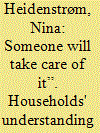

|
|
|
|
|
| Summary/Abstract |
Extensive infrastructure breakdowns are likely to become more frequent in the future as a result of continually complex and interconnected infrastructures vulnerable to weather and climate changes as well as intended attacks. By means of ethnographic interviews with households in Norway, this article examines their engagement in preparing for and coping with such breakdowns. It focusses on the division of responsibility between households, the authorities, and industry actors, and demonstrates that households do not believe they are responsible for preparedness, saw little advantage in contacting the authorities or industry actors, and chose to wait until someone handled the outage. However seemingly unprepared, households mobilised their social networks, used skills from previous experiences, local knowledge on infrastructure and weather, and material resources. Despite low engagement in the preparedness measures suggested by the authorities, we propose households to be considered key actors in societal preparedness by calling for greater attention to the socially shared practices households engage in that are not explicit preparedness actions, and for crisis management policies in the energy sector to provide the vehicles to mobilise household resources.
|
|
|
|
|
|
|
|
|
|
|
|
|
|
|
|
|
|
|
|
|